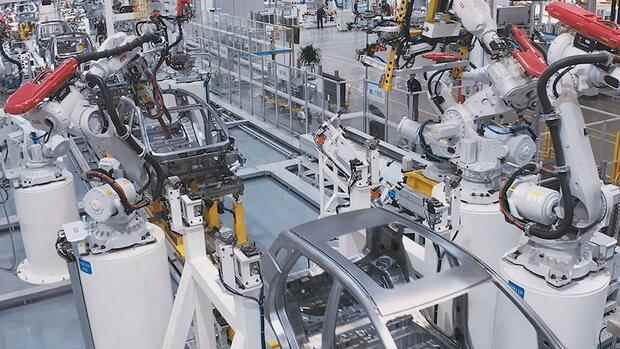ABB robots carry out many production steps independently. The group now also wants to enter the business with cobots that work together with human employees.
(Photo: ABB)
Munich The corona pandemic has already shown how fragile the supply chains in industry are. As a result of the war in Ukraine, many delivery routes have now been completely cut off, and as a result, for example, the plants of many car manufacturers have come to a standstill. According to the robotics industry, this will continue to drive demand for automation in the coming years.
“There has been a trend for some time, for example, to bring some production back to Europe,” said Marc Segura, who recently headed ABB’s robotics division, to the Handelsblatt. “This effect will continue to increase.”
Customers also want more sustainable products, and companies will probably have to produce closer and closer to the markets in the future. “Many no longer accept that a product is transported halfway around the world,” said Segura. Because of the shortage of skilled workers, so-called reshoring is only possible if production is highly automated.
The industry association IFR recently expected a new record sales of 435,000 robots sold last year. In 2024, the industry wants to install more than half a million new devices for the first time.
Top jobs of the day
Find the best jobs now and
be notified by email.
IFR Secretary General Susanne Bieller also expects a boost for the industry due to the global turmoil. For many entrepreneurs, the supply chain problems caused by the pandemic have now been the decisive trigger that justifies investments in robotics.
The new head of ABB’s robotics division wants to lead the segment to double-digit growth over the next few years.
(Photo: ABB)
According to the IFR, the industry expects growth rates of at least seven to eight percent a year for the next few years. Segura is even more optimistic. “There is a lot to be said for growth in the low double-digit range.” ABB wants to gain market share and become the market leader in technology and customer satisfaction.
ABB’s robotics and factory automation division had already benefited from the good situation in the industry last year. At $3.3 billion, the Swiss group turned over nine percent more than in the previous year. Incoming orders even rose by 29 percent to 3.8 billion dollars.
ABB is the world’s number two of the classic suppliers of heavy industrial robots, for example for welding in the automotive industry. But the group has been trying for some time to develop the new growth areas in robotics.
Cobots: ABB is entering the market with “robot colleagues”.
In addition, last year the Swiss launched a new model family in the segment of small, collaborative robots. ABB soon wants to play a leading role in the sale of so-called cobots. Industry pioneer Universal Robots is currently dominating the field.
The market for collaborative robots started later than expected in the initial euphoria. But the cobots are the big hope for growth in the robotics industry.
The industry is on the way to billions in sales, said the CEO of Universal Robots, Kim Povlsen, the Handelsblatt. “There is potential for about nine million cobots.”
ABB also wants to enter the business with autonomous transport robots. To this end, the group took over Asti Mobile Robotics last year. According to the company, it has the largest fleet of autonomous mobile robots in Europe.
The robotics industry expects major growth from the mobility turnaround
In recent years there has been repeated speculation that ABB could part with the robotics division, which is not particularly profitable. But most recently, the division was able to significantly improve profitability. The margin increased last year to 10.8 percent, the operating result by 50 percent to 355 million dollars.
Will the division remain part of the core business in the long run? “It’s a good time to be in the robotics industry,” Segura said simply. Many industries are only now being won over to robotics.
But the Spaniard also sees additional potential in the most important buyer of industrial robots – the automotive industry. So far, the use of industrial robots has primarily been about scaling production with high quality. “In the future, the flexibility of production will be decisive.”
ABB also manufactures robots for the logistics sector.
(Photo: ABB)
Combustion engine and electric cars will continue to exist side by side for a long time to come. That makes production expensive. In addition, the car is turning into a consumer product. “The model cycles are getting much shorter.” The manufacturers have to change their lines more and more frequently – intelligent automation is necessary for this.
More on the robotics industry:
For this new production reality, ABB has just launched two new robot models. For example, the IRB 5710 and IRB 5720 are to be used in the manufacture of batteries for electric cars. They have a load capacity of 70 to 180 kilograms and should be particularly flexible.
After all, new players are also expected in the industry, such as the electric car pioneer Tesla. Tech companies like Google and Amazon could enter the market alongside established manufacturers like Volkswagen and BMW. They would have to set up their production for the first time and probably rely on a high degree of automation – a large new market for the robotics industry.
More: What medium-sized companies have to pay for their first robot.
